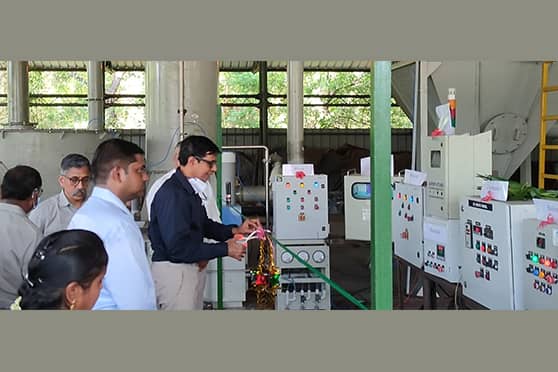IIT Madras’ municipal solid waste combustor commissioned at BHEL in Trichy


Indian Institute of Technology (IIT) Madras has developed an indigenous municipal solid waste combustor plant based on a first-of-its-kind rotary furnace technology to efficiently process unsegregated municipal solid waste generated in India, it said in a statement.
The plant has been deployed at a Bharat Heavy Electricals Limited factory in Trichy district of Tamil Nadu.
This unit was inaugurated on May 27 by V Kamakoti, director, IIT Madras, at BHEL Trichy. R Vinu, associate professor, Department of Chemical Engineering, IIT Madras, who led the project, participated in the event along with other BHEL officials and IIT Madras faculty.
The entire process from installation to commissioning of the plant was completed within six months. This plant is set up within the Combined Cycle Demonstration Plant premises of BHEL Trichy.
“Waste management is becoming an important issue that necessitates solutions that can scale and also help in quick and safe disposal. The first-of-its-kind solid waste combustor developed by IIT Madras not only addresses the scale and safe disposal issues, but also generates heat resulting in a waste-to-wealth creation,” said Kamakoti.
Developed indigenously, this facility can process up to one tonne of unsegregated municipal solid waste (MSW) per day and generate steam as the main output along with clean gaseous emissions and ash as a by-product. This initiative was part of the Ucchatar Avishkaar Yojana (UAY) project funded by BHEL under the Union ministry of education. It was developed by IIT Madras researchers at National Centre for Combustion Research and Development (NCCRD). This plant also plays a key enabling role in Swachh Bharat Mission.
The MSW generated In India is around 133 million tonnes a year of which more than 85% ends up in landfills. The total solid waste generation in Tamil Nadu is 14,600 tonnes/day with around 5,400 tonnes/day generated in Chennai (TNPCB, 2021). The MSW generation is increasing at 1.3% a year with a current per capita generation of around 0.5-1 kg/day.
According to BHEL executives, who partnered for this project, Indian municipal solid waste is heterogeneous and complex with high moisture (40-50%), low calorific value (≤ 2 kcal/g) and high inert, unlike the MSW of western origin. Existing incineration systems do not involve energy recovery and result in toxic emissions. The IITM-designed MSW incineration system addresses most of these challenges and offers users many desirable features in its design and operation. The need of the hour is both volume reduction of wastes and value generation via energy recovery from heterogeneous MSW.
Elaborating on the functioning of the solid waste combustor, Dr R Vinu, associate professor, Department of Chemical Engineering, IIT Madras, who led the project, said, “The initial phase of testing with a smaller scale rotary combustion unit at the National Center for Combustion Research and Development at IIT Madras with several grades of wastes gave us huge confidence in building this improved full-scale unit with efficient emission control at BHEL Trichy. The data from this unit in BHEL will help us to systematically scale-up the process in both distributed and centralised manner.”
BHEL would further carry out many tests and optimise operational philosophy for future scale-up and market this as a reliable and end-user-friendly product.